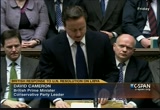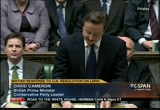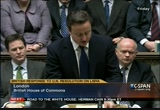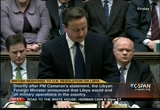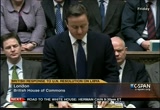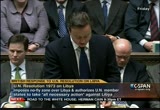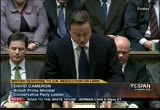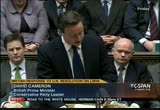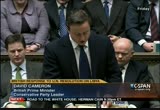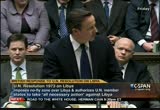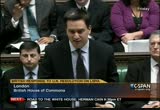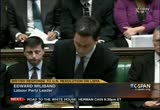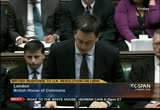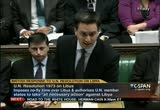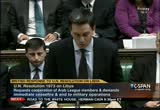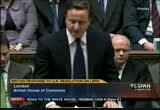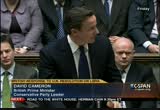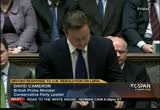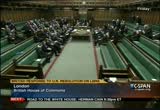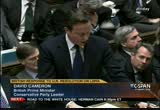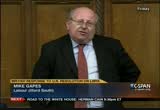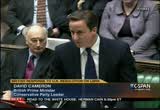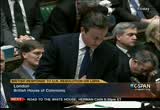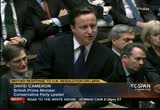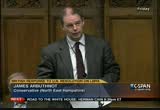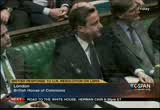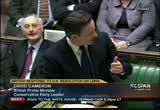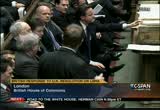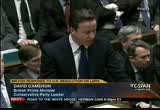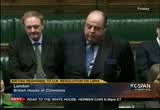tv International Programming CSPAN March 20, 2011 9:00pm-9:30pm EDT
9:01 pm
that more than 1000 people had been killed and many more injured in libya amidst credible and consistent reports of arrests, detention, and torture. the u.n. security council agreed to resolution 1970. this condemned his actions. it imposed a travel ban and asset freezes on those of the top of his regime. it demanded an end to the bylaws, access and restriction on the media. vitally, it referred the situation in libya to the international criminal court so that its leaders could face the justice they deserve. in my statement to this house on the 28 of february, i set of steps that would implement this measure. our consistent approach is been to isolate the bid up the regime, deprived it of money, shrink its power, and assure
9:02 pm
that anyone responsible for abuses in libya to be held to account. mr. speaker, intervening in another country's affairs should not be undertaken save in " exceptional circumstances. that is why we have always been clear the preparing for eventualities that might include the use of force, including a no-fly zone or other measures to stop it -- to stop humanitarian catastrophe would require three steps and three tests to be met. demonstrable need, regional support, and a clear legal basis. first, demonstrable need -- gaddafi's regime has ignored the demand of the u.s. security council 1970, that it stop the violence against the libyan people. his forces have attacked peaceful protesters and are now preparing for a violent assault on a city a million people that
9:03 pm
have a history dating back to 0.5000 years. then become -- have begun airstrikes on what we expect to be air, land, and sea forces. every home will be searched and there will be no mercy and no petition on. if we want any sense of what that might mean, we only have to see in what happened to so we zawia. human rights watchers have catalogued the appalling human rights atrocities that are being committed. mr. speaker, that is the demonstrable need. we said there must be clear which of the people of libya and the wider region for international action. it was the people of libya
9:04 pm
through the national council who were the first to call for protection through a no-fly zone. i would say this. it really has been remarkable how arab leaders have come forward and condemned the actions of the dot the's government. in recent days, i have spoken with leaders of saudi arabia, qatar, the united arab emirates and jordan. this support for -- this support for this goes far beyond the arab world. last month of three african members of the u.s. and three council voted in favor of the resolution. -- of the un security council voted in favor of the resolution. along with france, lebanon, and the united states, we worked hard to draft a proper language which could command the support of the international community. last night, the u.s. security council agreed to that resolution.
9:05 pm
resolution 1973 demands the immediate establishment of a ceasefire and a complete end to violence and all attacks against and abuses of civilians. it establishes a ban on all flights in the airspace of libya in order to protect civilians. it authorizes member states to take "all necessary measures to enforce compliance with the ban. crucially, it says this in paragraph number four. organizes member states, acting nationally or through regional organizations or arrangements and enacting for your cooperation to take all necessary measures to protect civilians and civilian populated areas under threat of attack, including been gauzy. mr. speaker, the resolution both authorizes and sets the limits of our action. it excludes the occupation force of any part of libyan territory which was a clear agreement, including the u.k., and the arab
9:06 pm
league's. i absolutely believe that this is the right thing, both to say and to do. as our ambassador to the united nations said, the central purpose of this resolution is to end the violence, protect civilians, and allow the people of libya to determine their own future, free from the brutality and leased by the gadhafi regime. they want the same rights and freedoms that a route one is demanding. resolution 1973 puts the way the security council squarely behind the libyan people in defense of those dollars. and our aims are entirely encapsulated by that resolution. mr speaker, demonstrable need, regional support and a clear
9:07 pm
legal base: the three criteria are now satisfied in full. now that the un security council has reached its decision there is a responsibility on its members to respond. and that is what britain - with others - will now do. mr speaker, the attorney general has been consulted and the government is satisfied that there is a clear and unequivocal legal basis for the deployment of uk forces and military assets. the security council has adopted resolution 1973 as a measure to maintain or restore international peace and security under chapter vii of the united nations charter. the resolution specifically authorises notifying member states to use all necessary measures to enforce a no fly zone and to protect civilians and civilian populated areas, including benghazi. the cabinet has met this morning. they have agreed that the uk will play its part. our forces will join an international operation to enforce the resolution if gaddafi fails to comply with its demand that he ends attacks on civilians. the defence secretary and i have now instructed the chief of the defence staff to work urgently with our allies to put in place the appropriate military measures to enforce the resolution - including a no fly zone. and i can tell the house that britain will deploy tornadoes and typhoons as well as air-to-
9:08 pm
air refuelling and surveillance aircraft. preparations to deploy these aircraft have already started and in the coming hours they will move to airbases from where they can start to take the necessary action. the government will table a substantive motion for debate next week. but i am sure that the house will accept that the situation requires us to move forward on the basis of the security council resolution immediately. i am sure that all sides of the house call upon colonel gaddafi to respond immediately to the will of the international community and cease the violence against his own people. i spoke to president obama last night and to president sarkozy this morning. there will be a clear statement later today setting out what we now expect from colonel gaddafi. conclusion mr speaker, any decision to put the men and women of our armed services into harms' way should only ever be taken when it's absolutely necessary. we have given extremely careful
9:09 pm
thought to the situation we have in hand. i think it is absolutely right that we play a leading role on the unc to counsel to secure permission for this section and i believe that it is absolutely right that we work with allies to make sure that resolution is brought about. i intend to answer all those questions in the hours and days ahead and to work with our brave armed services to make sure we do the right thing for the people of libya, for the people of our country, and for the world as a whole. >> can i start by thanking the prime minister for his statement. can i say that, from the side of the house, we welcome the security council resolution and support britain playing its full part in international action that is planned. the international committee has shown clear result.
9:10 pm
in his statement to a half weeks ago, we support feasible action for the libyan people. it is important that the british people are clear about the purposes of this resolution and the basis for the commitment of the british forces. any decision to commit british armed forces is a grave and serious one and must be based on a clear case. in this case, it is based, as the prime minister said, on the clear evidence of colonel gaddafi brittle is in his own people in response to the demand for democratic change. it is action back in the region must and partly by the clear resolution of the arab league and it is back now by a leading mandate by the united nations. military action has brought support a legal base and recognizes our responsibility to
9:11 pm
protect libyan people. these are necessary preconditions for legitimate and effective action and it will be quite wrong, given what has happened in libya, forced to stand by and do nothing. mr. speaker, to ask some questions about the objective of the new commission. first, we need to be clear about the purpose of the smidgen -- of this mission. the whole world is aware of the urgency of the situation, given the attention of colonel gaddafi. can the prime minister reassures that it can be taken on a * silicon make a real difference to the people and in gaza? beyond this, should come as we hope, the resolution stopped the gadhafi regime, the libyan future remains uncertain. is there a strategy for libya's future given success in this
9:12 pm
plan. in this house, there is agreement that libya's future will be far better serve without colonel gaddafi in power. does the prime minister agree that a range of other measures should continue to be brought to support the efforts of the libyan people in order to undermine the support of colonel gaddafi. we should be working to sharpen -- and pressure other members of the regime and make explicit the wrist to countries -- make explicit the risk to countries who employ mercenaries. can i urge him to ensure that discussion take place at the earliest date with the arab league's european union on a continuing basis or contingency
9:13 pm
planning for a stable and viable state beyond colonel gadhafi? can i also, in the broader context of the region, emphasized to him that we should continue to show the utmost vigilance about elements elsewhere, including in bahrain, and make plans throughout the region. can the prime minister reassure us that all steps are being taken to ensure those participating in any military action reflect a broad range of support, including from the arab league. does he agree that that will require continuing diplomatic effort to make sure it happens? tonight for the rest among the contingencies being prepared and subject to the operational limits of what he can say, how does he envisage the military chain of command operation? third, let me ask about the humanitarian said isituation in.
9:14 pm
we will have noted with concern the addition of the red cross prior to the revolution to bengahzi?from been gauz at this time, on the side of the house, we will give our full support to the on forces. once again, they are engaging in dangers and courageous action on behalf of our country. we salute their professionalism and bravery. they are serving to uphold the will of the international community, including the united nations. in their service, i believe there will have the support of the whole house. >> prime minister,. >> let me try and answer all the questions that he has put.
9:15 pm
in terms of the time scale, the issue is this. the security council resolution is absolutely clear in the first paragraph that there should be a stop of the dock the's attack on his people. if that does not happen, consequences will follow end all military action and measures -- we are able to do that on a time scale that i believe will be effective. in terms of our broader strategy, what we believe we need is a transition towards a more open society and towards a better democracy. we have to be clear about our a im. this is about protecting people and saving lives. this is not about using the garment of libya. that is an issue for the libyan people. in terms of mercenaries, this is included in the u.s. security council resolution. i think that is welcome. -- in the u.n. security council resolution. i think that is welcome.
9:16 pm
in terms of consultations with the arab league and with arab countries, there will be meeting in paris tomorrow, in which president sarkozy has called. i will attend and there will be members of the arab world coming together to bring together a coalition. we must be vigilant elsewhere with all the challenging problems in our world today and he mentioned bahrain and he is absolutely right. the government is keeping its travel advice and is helping british nationals in bahrain, yemen, and elsewhere apparently under review and the regularly to make sure that we help as many people as necessary. as part of -- in terms of terribly participation, we see get the participation from some arab countries. i believe we will get that from some of the calls i have made. in terms of the military chain of command, to begin with, this is to be a joint operation, if
9:17 pm
necessary, carried out by britain, america, and france combined with other participation and it will be coordinated in that way. in terms of british nationals, obviously, almost all those who want to leave have left. there are some who remain. we have our relationship with the turkish embassy who is working with us in tripoli and we have an active counselor figure in been gauzy -- an active consular figure in bengazi. this is to make sure that humanitarian aid gets through. above all, as he said, any decision to put any men and women of armed forces in harm's way it should only be when aslan necessary. but i believe as he said that we cannot stand back and let a dictator kill his people
9:18 pm
indiscriminately. to do so would send a chilling signal to others. we should be clear about where our interests lie. in this country, we know that colonel gaddafi is capable of. we should not let him step onto british soil. we should not allow a situation their stateish stat should step on british soil. >> may i ask the prime minister whether, consistent with the un resolution, as he has indicated, refers will military measures to protect civilian- populated area? will he confirm that that will enable our forces to be used,
9:19 pm
not simply to intercept libyan aircraft, but if necessary to attack heavy artillery, tanks, and other military units on the ground that may be fattening civilian-populated areas? >> i think the gentleman for his support and agree with him that time is not crucial. it is vital that we have this u.s. security council resolution and have made very clear the resolution to colonel gaddafi. in terms of the question, it talks about in paragraph four, all necessary measures to protect people, to protect civilians, and mentions specifically bengazi. that does mean that we can take measures to help those things be achieved. it is very important. we understand that. >> can i congratulate the prime minister and those in the
9:20 pm
foreign office on the work they have done in this chapter 7 resolution? can i also say that the french government needs to get a lot of credit as well for they also worked very hard on this? can the prime minister clarify the role referred to in the resolution of the african union as well as the arab league's? is there any possibility, given that three african states, including south africa, also voted for the resolution and the african union could use good offices to find a way to get gaddafi at a power was out this conflict going on for very long time? >> he makes an extremely good point about leadership that nicolas sarkozy and the french have taken in this role. i think the role of the french and the british and the lebanese, together on the u.n.
9:21 pm
security council, is vital. this team did a superb job at marshaling support. it is a very strong resolution and extremely comprehensive. i hope it marks a new start in what the u.n. can be able to achieve. we hope there will -- there are african mission is going to libya. we're happy that the three african members voted for the resolution. >> one of -- and i can rest with the prime minister on his success and leadership on this issue and offer my full support and join him in paying tribute to france and the un in what is a deplorable -- a remarkable diplomatic success? i am sure that he will agree
9:22 pm
that difficult questions remain. however, right now, it is incumbent of all this to get behind the armed forces, particularly our air men. >> hour -- my hon. gentleman is exactly right. there are difficult questions. we are embarked on a difficult course. we set a limit on the course. this is not an army of occupation. i think it is important that we understand that that is correct. people across the arab world want to hear it. our thoughts, everyone in this house and everyone in this country, will want to do with the armed forces and their families who will be preparing potentially for difficult days ahead. >> the government and the armed forces are in full support of this matter appeared in determining the appropriate the intervention, surely there is another factor, whether we have the capacity -- will the prime
9:23 pm
minister and his colleagues have another look at the sdsr to see a far country will continue these assets in the future? >> i see it as a person party for me as prime minister. even at the end of this defense review, at the end of this parliament, we will have the fourth largest defense budget and you were in the world. we have superbly equipped armed forces. when it -- many of the decisions we took was to make sure they have flexibility, the ability to deploy, the ability to be in that kind of very, at extra investment in special forces, sure investment in transport. the typhoon is an aircraft not involved in afghanistan. our planning for what may be necessary in libya does not affect the efforts that we're
9:24 pm
making in afghanistan with our allies. >> my right hon. friend has shown a breathtaking show of courage and leadership. does my right hon. friend agree that, while reaching change is not the aim of this resolution, in practice, there is little realistic chance of achieving the aims of these resolutions without having regime change. >> i think my hon. friend puts it extremely well. the aim is clear. the aim is to put in place the u.n. security council. that is a cessation of hostilities, the protection of lives, the protection of people. it is to make sure that arms denied it to libya, that assets are freed -- those are the ins and that is what we must now pursue.
9:25 pm
of course, many leaders the world over, we have all said that gadhafi's to go in order for libya to have a peaceful, successful, and a democratic future. that's still remains the case. we should be very clear in this international audience we are building. those are our aims. >> abuses of human rights and repression of libyans -- of civilians are not unique to libya. should we develop before policy that would be able to counter prevention elsewhere? pahokee thought this whole thing through. we may well be involved in a civil war in libya for some time to come. >> i do sometimes want to me to this argument with the expression that, even if you can
9:26 pm
do the right thing ever, it does not mean that you should not do the right thing somewhere. what is happening in libya is different. you have a different situation of a people rising up against leaders and wanting to have a more democratic future. and then watching as potentially the people are destroyed by that dictator. what you see coming together is written acting with others in favor of international law and international government and governments of the un and and all that is right and decent of the world. it is not in our national interest i hope that, not just across the world, but across the country, we should be able to build a broad coalition for support of the action we're taking, encompassing all those people that care about international law and what is good and right in our world and
9:27 pm
recognize the hard headed assessment of british national interest, which means we should not stand aside on this. >> i welcome the prime minister's statement. i think he's absolutely right that the international committee take early action for civilians. they are doing all they can to monitor the situation when and communication. >> of this way, we never comment on security and intelligence matters in this house. but the point he makes about the international criminal court and making sure we are clear, as i have said, the arm of international law should have a long arm, and a long reach, and a long stride. >> given that is the outcome,
9:28 pm
all actions have consequences. how can he be so sure that what we're doing will not lead as a consequence to end up in a situation where a complex and dangerous situation is made worse? >> we have to look at the consequences of doing nothing, the oppression of the people, and then we have u.s. quarter the cost questions of action? what is so convincing is this case is the to have the arab league countries and arab populations, why believe are willing to lead the international community on. it is good that the international community is coming together and showing that you care about our democracy and not just your security. i think we can win that argument. we will have to go on with their
9:29 pm
leaders and populations and make sure to communicate with them strongly why it is the right thing. will the prime minister agree with me that there will be importance in the weeks to come. this country plans to go ahead in keeping the middle east peace process so that it can draw the poison from the welle. >> i think my hon. friend makes an extremely good point. a palestinian leader said to me, if you really want to secure a long-term defeat at al qaeda, and the combination is on more democracy and freedom across north africa and the middle east and the solution
182 Views
IN COLLECTIONS
CSPAN Television Archive
Television Archive  Television Archive News Search Service
Television Archive News Search Service 
Uploaded by TV Archive on

 Live Music Archive
Live Music Archive Librivox Free Audio
Librivox Free Audio Metropolitan Museum
Metropolitan Museum Cleveland Museum of Art
Cleveland Museum of Art Internet Arcade
Internet Arcade Console Living Room
Console Living Room Open Library
Open Library American Libraries
American Libraries TV News
TV News Understanding 9/11
Understanding 9/11